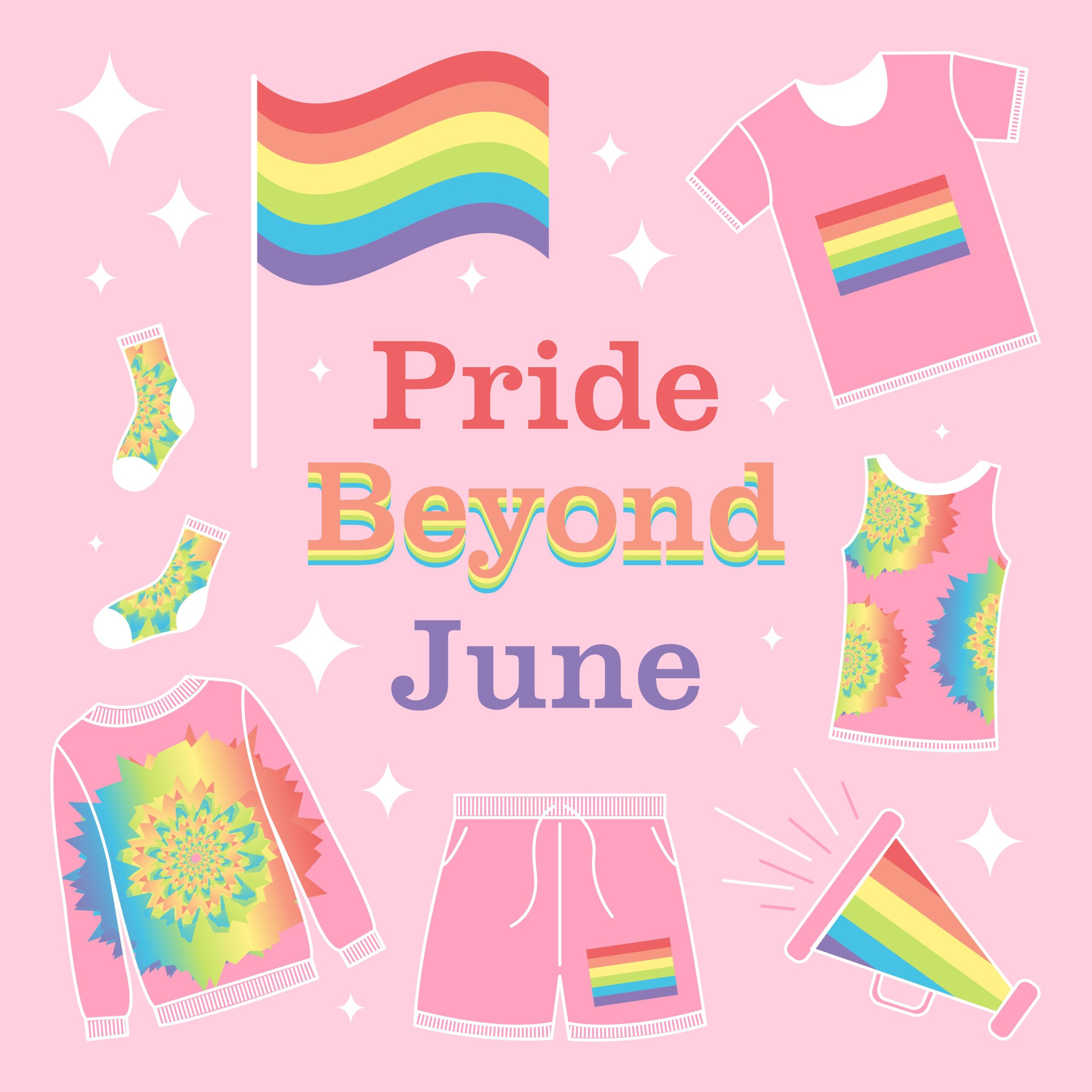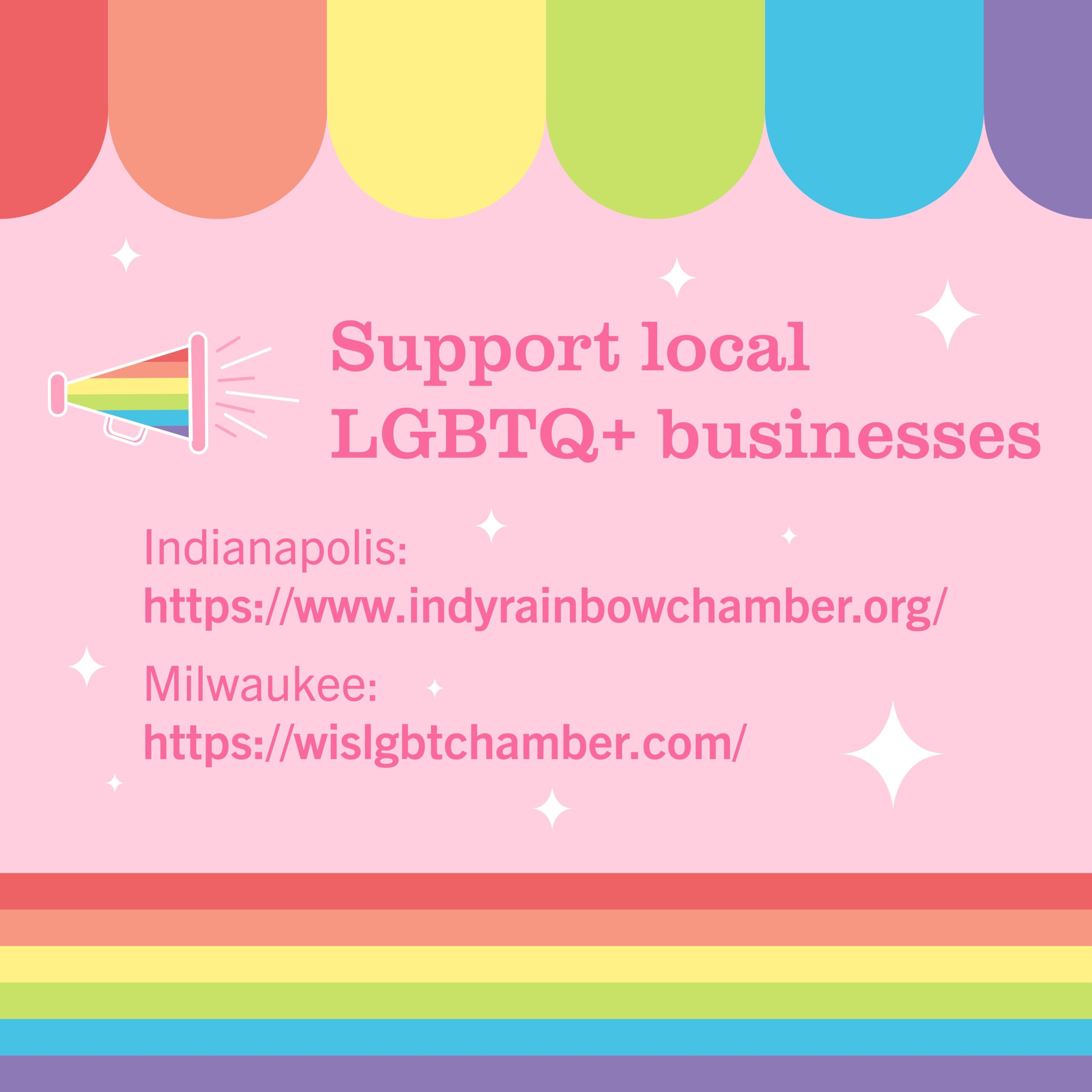With Pride Month’s passing, the vivid array of rainbow memorabilia has been cleared from the shelves of department stores. But the absence of a celebratory month and the colorful arches doesn’t mean allyship can rest.
Which even some of the most well-meaning brands don’t understand.

That’s what we call “rainbow washing”
You may have heard the terms rainbow washing and rainbow capitalism used in recent conversation. And with more companies producing pride collections, you’re sure to hear them more frequently. These phrases describe superficial support of the LGBTQ+ community from businesses and corporations. This feigned endorsement is driven by sales or consumerism instead of activism and allyship.
Oftentimes, what people consider rainbow washing varies — it lies on a spectrum. But even the more “subtle” examples classify. So let’s dissect what that means and how to avoid pseudo-allyship.
Why we’re talking about this
At the end of the day, rainbow washing equates to exploitation. How? Selling rainbow-clad clothing for a single month out of the entire year distracts from the true meaning of Pride. Which should actually serve as a reminder of solidarity, advocating for acceptance and equality, and the resistance to discrimination and violence.
Rainbow washing encourages people to promote allyship with purchases instead of through activism or donations, specifically impacting the LGBTQ+ community. Paying for goods from large corporations takes money and sales directly from LGBTQ+ artists, smaller shops, and the business owners.
But it isn’t just about the money. This ultimately diminishes the oppression and hardships the community faces. Seeing a selection of prismatic clothing, coffee mugs, and accessories files Pride down into a cute and trendy fad instead of a celebration rooted in fighting against oppression.
The good, the bad, and the true allies
It may come as no surprise that several large corporations use surface-level support of the LGBTQ+ community as a money grab. Businesses like Amazon, Walmart, and McDonald’s have vocally supported gay rights or Pride — whether through written statements, social posts, or seemingly inclusive campaigns. However, these same companies have donated to politicians who oppose the equality act and those actively trying to strip away this community’s rights.1
But not every business has a double-sided agenda. Brands like ASOS and Bombas consistently partner with organizations like GLAAD and The Ally Foundation. ASOS donated 100% of the net sales from their 2020 Pride Collection to GLAAD. Meanwhile, for every item purchased, Bombas donated a pair of socks to homeless LGBTQ+ community members.2
One truly noteworthy brand is The North Face (TNF). One of their brand values is that the outdoors should be a safe and accepting place for everyone — no exceptions. To support this, TNF partners with and donates to Brave Trails — an organization and residential summer camp for LGBT+ youth. But the support goes past the donations.
For the last two years, TNF has partnered with well-known drag queen influencer Pattie Gonia. She creates light-hearted, pun-filled, humorous ads for The North Face’s Summer of Pride Tour. This event encourages LGBTQ+ hikers or adventurists to come together in an outdoor setting through the U.S. Yet the support still doesn’t end there.
When TNF received backlash for the choice in spokesperson, they doubled down. In a press release, the brand leader stated, “The North Face has always believed the outdoors should be a welcoming, equitable, and safe place for all. Creating community and belonging in the outdoors is a core part of our values and is needed now more than ever. We stand with those who support our vision for a more inclusive outdoor industry.”3
Showing their unwavering support and solidarity with Pattie Gonia and the rest of the LGBTQ+ community solidified that TNF believes in their claimed values. And their reassurance helps make the voices and needs of the LGBTQ+ community heard.
Putting allyship into practice
Allyship extends beyond the creative that marketing agencies create and brands publish. Inclusive media, generous donations, and a public statement is only the beginning. To be a true ally, DEI efforts need to be embedded in the core of your company.
As a marketing agency, we’re lucky to be in an industry that’s generally filled with open-minded, socially progressive, creative types. But it’s still critical to demonstrate to LGBTQ+ employees that they belong. That’s shown through action — creating an inviting and comfortable workplace, making it known how your company actively and continuously supports the LGBTQ+ community, and education and conversations in DEI efforts surrounding LGBTQ+ worries, needs, and history.
Diversity in all its forms and flavors is a big part of what makes an ad agency — and businesses in general — work. Different backgrounds, experiences, cultural nuance, all of it. If everyone is cut from the same cloth, we’d make the world’s most boring quilt, right? So apply this to your own brand.
Getting started
Here are three tips for those who don’t know where to begin:
- Provide a resource group or forum for your LGBTQ+ employees.
- Partake in community outreach with LGBTQ-focused or -run organizations.
- There’s no such thing as too much involvement — so get out there and show your support.
And, as a bonus tip, support local businesses.
LGBTQ+ Businesses in Indiana
LGBTQ+ Businesses in Wisconsin

If you’re looking for an agency that embraces, values, and celebrates diversity, MKR would love to chat.
1. https://www.businessinsider.com/amazon-walmart-mcdonalds-companies-show-pride-donated-anti-lgbtq-politicians-2021-6
2. https://www.insider.com/38-brands-celebrating-pride-with-collections-that-support-lgbtq-people-2020-6
3. https://www.npr.org/2023/06/15/1179524951/lgbtq-pride-month-companies-backlash-north-face-target-bud-light#:~:text=The%20North%20Face%20has%20always,needed%20now%20more%20than%20ever

